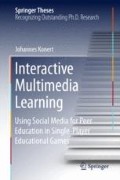Abstract
To improve the effectiveness of group learning in general, and to address in particular opportunities for educational games, this chapter introduces a technique to match users by considering homogeneous and heterogeneous criteria for matching. First, the chapter identifies the requirements for the algorithmic design, based on the findings from related work analysis and the Group Formation Problem (Sect. 2.1.3). Second, the modeling of matching criteria is derived (Sect. 6.1) and metrics for the group formation algorithm are developed (Sect. 6.2). This includes the proposal of three matching algorithms, and the metrics of GPI and CPI, which fulfill the defined requirements. Finally, the approach towards optimization is discussed and algorithms are designed to optimize the cohorts and handle incremental updates. Details about the corresponding conceptualized API methods can be found in Sect. A.1.
Access this chapter
Tax calculation will be finalised at checkout
Purchases are for personal use only
References
Johannes Konert, Dmitrij Burlak, Stefan Gobel, and Ralf Steinmetz. GroupAL: ein Algorithmus zur Formation und Qualitatsbewertung von Lerngruppen in ELearning- Szenarien mittels n-dimensionaler Gutekriterien. In Andreas Breitner and Christoph Rensing, editors, Proceedings of the DeLFI 2013: Die 11. e-Learning Fachtagung Informatik der Gesellschaft fur Informatik e.V., pages 71–82, Bremen, Germany, 2013. Kollen. ISBN 9783885796121.
Dmitrij Burlak. Analyse, Design und Implementierung von algorithmenbasierter Lerngruppen-Optimierung. Master thesis (department type number kom-d-0462), Technische Universitat Darmstadt, 2013.
William Damon. Peer Education: The Untapped Potential. Journal of Applied Developmental Psychology, 5(4):331–343, December 1984. ISSN 01933973.
Alon Lisak and Miriam Erez. Leaders and followers in multi-cultural teams. In Proceeding of the 2009 international workshop on Intercultural collaboration - IWIC ’09, page 81, New York, New York, USA, February 2009. ACM Press. ISBN 9781605585024.
Kyong Jin Shim and Jaideep Srivastava. Team Performance Prediction in Massively Multiplayer Online Role-Playing Games (MMORPGs). 2010 IEEE Second International Conference on Social Computing, pages 128–136, August 2010.
B Barry and G L Stewart. Composition, Process, and Performance in Self- Managed Groups: the Role of Personality. The Journal of Applied Psychology, 82 (1):62–78, February 1997. ISSN 0021–9010.
Asma Ounnas, David E. Millard, and Hugh C. Davis. A Metrics Framework for Evaluating Group Formation. Proceedings of the 2007 international ACM Conference on Supporting Group Work - GROUP ’07, page 221, 2007.
Ryan Cavanaugh and Matt Ellis. Automating the Process of Assigning Students to Cooperative-Learning Teams. Proceedings of the 2004 American Society for Engineering Education Annual Conference & Exposition, 2004.
Asma Ounnas, Hugh Davis, and David Millard. A Framework for Semantic Group Formation. Eighth IEEE International Conference on Advanced Learning Technologies, pages 34–38, 2008.
Pedro Paredes, Alvaro Ortigosa, and Pilar Rodriguez. A Method for Supporting Heterogeneous-Group Formation through Heuristics and Visualization. Journal of Universal Computer Science, 16(19):2882–2901, 2010.
Jorg Haake, Gerhard Schwabe, and Martin Wessner. CSCL-Kompendium: Lehrund Handbuch zum Computeruntersutzten Kooperativen Lernen. Oldenbourg Verlag, 2004. ISBN 3486274368.
Author information
Authors and Affiliations
Corresponding author
Rights and permissions
Copyright information
© 2015 Springer International Publishing Switzerland
About this chapter
Cite this chapter
Konert, J. (2015). Peer Group Formation for Learning. In: Interactive Multimedia Learning. Springer Theses. Springer, Cham. https://doi.org/10.1007/978-3-319-10256-6_6
Download citation
DOI: https://doi.org/10.1007/978-3-319-10256-6_6
Published:
Publisher Name: Springer, Cham
Print ISBN: 978-3-319-10255-9
Online ISBN: 978-3-319-10256-6
eBook Packages: EngineeringEngineering (R0)

